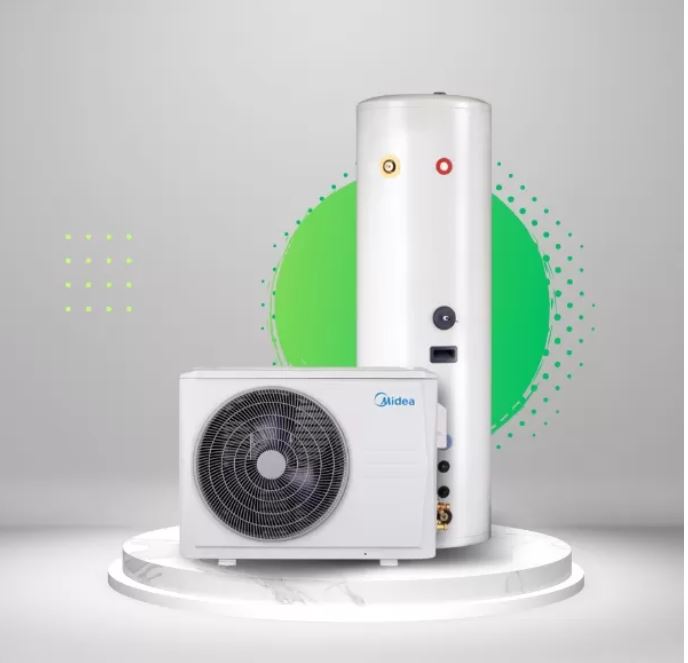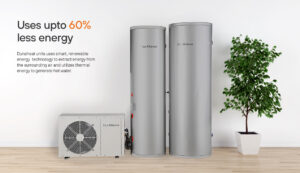
Heat pump hot water systems have become a popular, energy-efficient solution for both residential and commercial properties across Australia. These systems use electricity to transfer heat from the air into water, significantly reducing energy consumption compared to traditional electric water heaters. With growing environmental concerns and rising energy costs, heat pump water heaters offer a sustainable way to meet hot water needs while lowering carbon footprints.
How Heat Pump Hot Water Systems Work
Heat pump systems operate by extracting heat from the surrounding air, compressing it, and transferring it to the water in a storage tank. This process is similar to how refrigerators or reverse-cycle air conditioners work, but in reverse. Even in lower temperatures, heat pump systems can effectively heat water, making them suitable for various Australian climates.

The system’s efficiency lies in its ability to use less electrical energy, as it relies on capturing ambient heat rather than generating heat from scratch. For every unit of electricity consumed, heat pumps can produce two to four units of heat, making them significantly more efficient than conventional electric water heaters.
Key Benefits of Heat Pump Hot Water Systems
- Energy Savings: Heat pump water heaters can reduce electricity usage by up to 60-70% compared to conventional systems. This translates into substantial savings on energy bills, especially for households with high hot water demand.
- Lower Carbon Footprint: With reduced energy consumption, heat pump systems contribute to lower greenhouse gas emissions, supporting Australia’s commitment to reducing environmental impact.
- Government Rebates and Incentives: Many states, including New South Wales (NSW) and Victoria, offer financial incentives to encourage the adoption of energy-efficient technologies like heat pump water heaters. Programs such as the Victorian Energy Upgrades (VEU) and the NSW Energy Savings Scheme (ESS) provide rebates, helping offset the initial installation costs.
- Suitable for Various Climates: Modern heat pumps are designed to perform efficiently even in cooler climates, making them ideal for homes across Australia, from coastal regions to the colder southern areas.
Choosing the Right Heat Pump Hot Water System in Australia
Selecting the right system depends on several factors, including household size, water usage patterns, and climate. When considering a heat pump system, it’s essential to choose one with the right capacity to meet your home’s hot water needs. For example:
Additionally, opting for energy-efficient models with high Coefficient of Performance (COP) ratings ensures optimal performance while reducing long-term running costs. Look for systems that are eligible for government rebates, as this can reduce upfront costs significantly.
Installation Considerations and Costs
Installing a heat pump hot water system involves considerations such as location, noise, and climate. Ideally, the unit should be installed outdoors in a well-ventilated area where it can draw in ambient air. Some systems may produce noise during operation, so placing the unit away from bedrooms or living areas is recommended.
In terms of cost, the installation of a heat pump system can range between $3,000 and $7,000. However, with government rebates, the net cost could be significantly lower. For example, the Victorian Energy Upgrades (VEU) program offers financial incentives for households and businesses that switch to energy-efficient technologies, including heat pump water heaters.
Maintenance and Lifespan
Like any water heating system, heat pumps require routine maintenance to ensure they operate efficiently. This includes:
- Checking the pressure relief valve.
- Cleaning the air filter to maintain airflow efficiency.
- Inspecting for refrigerant leaks.
With proper maintenance, a high-quality heat pump water heater can last up to 15 years or more, providing long-term savings on both energy and maintenance costs.
Maximizing the Benefits of Heat Pump Systems
To maximize the energy savings of your heat pump hot water system, consider the following tips:
- Install with Solar PV: Pairing a heat pump system with solar panels can further reduce running costs by using renewable energy to power the system.
- Off-Peak Electricity: If possible, set your system to heat water during off-peak electricity times, lowering energy costs.
- Regular Maintenance: Keeping the system well-maintained ensures optimal performance and longevity.
Conclusion
Heat pump hot water systems are an energy-efficient, eco-friendly solution that is well-suited to Australia’s climate and energy needs. With the added advantage of government rebates, they offer a cost-effective way to reduce energy consumption and lower household or business utility bills. Whether you’re looking to upgrade your existing hot water system or make a new energy-efficient choice, a heat pump water heater is a smart investment in both cost savings and environmental sustainability.
For more information on government rebates and programs that support the installation of heat pump water systems, Visit Sunrise Saves Energy.

